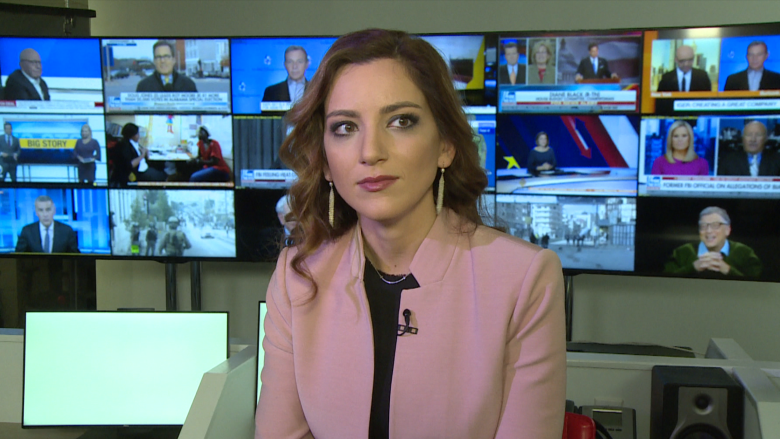#MeToo scores modest win in Russia as lawmaker investigated — albeit briefly — by ethics committee
The #MeToo movement has struggled to gain traction in Russia, but a couple of modest victories offer some women hope that the hostility faced by those who complain about sexual harassment might be ebbing ever so slightly.
Powerful Russian lawmaker Leonid Slutsky, the head of the Duma's foreign affairs committee, was recently accused of harassing four journalists. The women say he tried to kiss or grope them when they asked for interviews.
The ethics committee began investigating the complaints against Slutsky this week and at least two of the women appeared before the committee on Wednesday.
But before the day was out, the committee ruled against the women and found Slutsky hadn't behaved inappropriately.
Ekaterina Kotrikadze, one of Slutsky's accusers, told CBC she's disappointed but not surprised with the ruling, which suggested the complaints against Slutsky might be part of a "political conspiracy."
"Can you imagine something like that in the Western world?"
Nonetheless, she says the attempt to hold Slutsky accountable was still worth it.
"I think our story has turned a lot of women's minds. It's not going to be easy."
Despite the committee's ruling, Slutsky, 50, issued an apology on his Facebook page earlier this month — on International Women's Day — for any "distress" he'd caused. He claims the lecherous behaviour he's accused of was never done "out of malice."
"''I'm sorry' is already an achievement," Kotrikadze said during an interview earlier in the week.
In Canada, a limited apology like Slutsky's wouldn't help a politician save his job, but in Russia it amounts to progress, she said.
"But of course," she said, "this is not enough."
Kotrikadze said her encounter with Slutsky occurred seven years ago in an office at the Moscow TV station where she worked.
"He just pulled me to the wall and tried to kiss me and touch me," she said. "I remember that I pushed him back.
"I was astonished and scared and ran away."
Similar stories
Journalist Daria Zhuk, 27, said Slutsky tried to kiss her when he came to do an interview at Moscow's Dozhd television, or TV Rain, four years ago.
She said Slutsky asked her out to dinner repeatedly and that he suggested he'd scrap the interview unless she agreed.
"He tried to kiss me. He tried to touch me," she told CBC News in the TV Rain newsroom, where she works as a producer.
Zhuk was among the first women to complain about Slutsky. At first she spoke anonymously to the media, but she decided to reveal her identity after some of Slutsky's colleagues came to his defence and accused the women of trying to ruin his reputation.
"We don't know what to do in such a situation. We're ashamed to talk publicly about it," Zhuk said.
"But it's people acting like Mr. Slutsky who should be ashamed."
BBC producer Farida Rustamova alleges when she went to Slutsky's office in search of comment for a story last year he tried to grope her and suggested she become his mistress. Rustamova says she has proof of Slutsky's behaviour — an audio tape — though the BBC has yet to play it publicly.
Slutsky posted his apology a little more than a week after Rustamova came forward.
Russian state TV has largely ignored the Slutsky controversy. When the issue of sexual harassment has come up, most commentators have dismissed it, suggesting Russian women are happy with their traditional roles and that the idea of unwanted sexual attention is an irrelevant Western phenomenon.
Some of the women who have complained about Slutsky were publicly mocked and accused of being publicity seekers; others of trying to spread anti-Russian ideas.
'We don't live in Europe or America'
Latvian news site Meduza compiled the responses of some high-ranking officials.
"We don't live in Europe or America, so why should we copy everything they do?" said Tamara Pletneva, the head of the Duma's family affairs committee, as she echoed the often repeated state TV talking point that complaining about harassment is a made-in-the-USA phenomenon that has no place in Russia.
Valery Gartung, another prominent member of the Duma, said it appeared the scandal with Hollywood producer Harvey Weinstein might be encouraging more women to talk about sexual harassment.
"I hope not," he said.
Another member, Anton Morozov, turned the harassment allegations into a punchline.
"Mr Slutsky, this is outrageous," he said mockingly. "Share some of this with the other members of the international affairs committee.
"I'm prepared to take a couple of journalist girls myself."
- OPINION| An inappropriate joke by an MP is not really a #MeToo moment
And yet, faced with protests outside the Duma and many deputies clearly growing weary of the scandal, Slutsky backed down and apologized.
"I am sure Mr. Slutsky never imagined that the pressure would get that bad," said Kotrikadze, who now works for a Russian-language TV network based in New York City.
The other unexpected development was that an important government official appeared to throw her support behind those taking on Slutsky.
Maria Zakharova is best known for her scathing anti-Western diatribes as the chief spokesperson for Russia's Ministry of Foreign Affairs.
But in a recent TV interview, she said Slutsky had acted inappropriately with her, too.
Without providing specific details, she said the encounter occurred four years ago at a St. Petersburg restaurant and that she didn't feel supported by the other men and women who were there.
"If you feel that somebody crosses the line, offends and humiliates you, you must tell about it right away," she told Kremlin-friendly NTV.
Daria Zhuk, who's now producing a program dedicated to women's issues for TV Rain, said she hopes other women will feel empowered to speak about their experiences with sexual harassment.
"We will push and push through public opinion, and through our stories."



